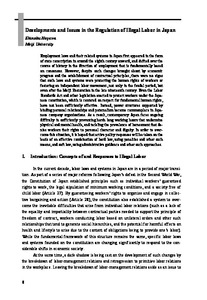Developments and issues in the regulation of illegal labor in Japan

"Employment laws and their related systems in Japan first appeared in the form of state conscription in around the eighth century onward, and shifted over the course of history in the direction of employment that is fundamentally based on consensus. However, despite such changes brought about by economic progress and the establishment of contractual principles, there were no signs that such laws and systems were protecting the human rights of workers or fostering an independent labor movement, not only in the feudal period, but even after the Meiji Restoration in the late nineteenth century. Even the Labor Standards Act and other legislation enacted to protect workers under the Japanese constitution, which is centered on respect for fundamental human rights, have not been sufficiently effective. Instead, power structures supported by binding personal relationships and paternalism became commonplace in Japanese company organizations. As a result, contemporary Japan faces ongoing difficulty in sufficiently preventing harsh long working hours that undermine physical and mental health, and tackling the prevalence of harassment that denies workers their rights to personal character and dignity. In order to overcome this situation, it is hoped that active policy responses will be taken on the basis of an effective combination of hard law, using penalties and other such means, and soft law, using administrative guidance and other such approaches."
Digital
The ETUI is co-funded by the European Union. Views and opinions expressed are however those of the author(s) only and do not necessarily reflect those of the European Union or the ETUI.